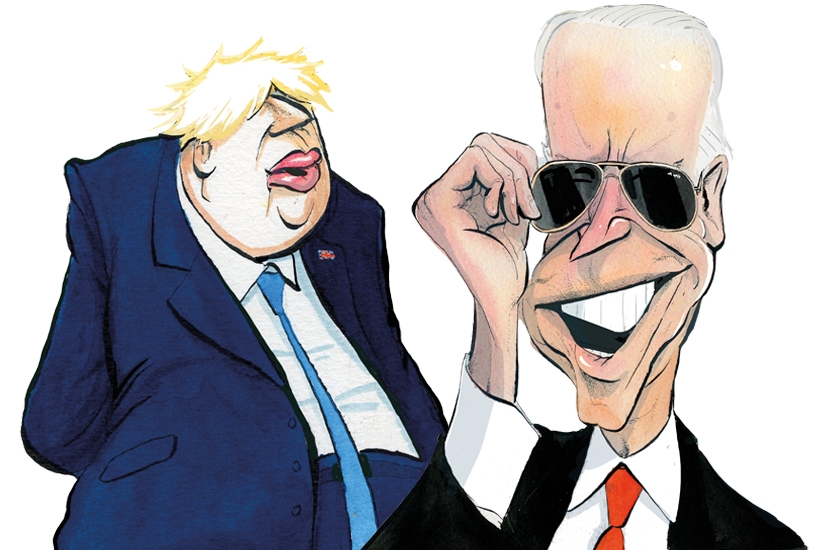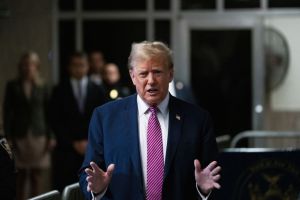Donald who? As Boris Johnson meets Joe Biden in Cornwall this week, the British prime minister will hope that the President doesn’t dwell on his efforts to woo the last occupant of the Oval Office. Boris’s dalliance with Donald Trump is a bit like his affair with Jennifer Arcuri — an embarrassing fling with a rotund, brash American conspiracy theorist, something he’d rather the world forgot. He’s moved on and so should we.
Boris wouldn’t, for instance, want Biden to be reminded of the time in November 2017 when, as foreign secretary, he went on Fox News to say of Trump: ‘What you’ve got to realize is that the American president is just one of the huge, great global brands… He is penetrating corners of the global consciousness that I think few other presidents have ever done.’ Slurp.
The good news for ‘global Britain’ is that Biden doesn’t remember much. This week’s G7 meeting is the Commander-in-Chief’s first overseas trip. He has several decades of experience in foreign affairs, but he is 78. There’s a whiff of anxiety in Washington circles as to whether he’ll be up to all those photo-ops, press conferences and mentally grueling discussions with other world leaders.
So far this month, the President’s schedule has been lighter than usual (the amount of time he spends resting is already a running joke among crueler right-wing commentators). The speculation is that he’s saving his energies ahead of his transatlantic escapade. Nobody is expecting the new President to be a terrifyingly switched-on interlocutor.
The bad news is that Team Biden, in as much as it thinks about Boris Johnson, Brexit or Britain at all, is somewhat hostile. ‘They can recall Boris’s attempts to toady up to Trump,’ says Jeremy Shapiro, an American research director at the European Council on Foreign Relations. ‘He just isn’t a person Biden-world is much impressed by. They’re much more interested in competence, seriousness and, er, grooming.’
This means that Team Boris’s attempts to send out ingratiating signals to Washington may prove futile.
Even before Biden won the US election in November, and especially in recent weeks, Westminster’s media voices have been chirruping the idea that, for all their apparent differences, on issues such as climate change, the global pandemic response and China, Boris and Biden are singing from the same magnificently boring policy paper.
Moreover, the voices add, any lingering resentments or grubby associations between Brexit and Trump are as nothing to the — all together now — profound and enduring security and strategic interests which bind the United States to the United Kingdom. Those ties are just too important to be derailed by political differences.
There’s truth in these platitudes. The ‘special relationship’ is a term Boris prefers to avoid. He finds it ‘needy’. But Britain does need America, and America, to a far lesser extent, needs Britain. That’s why the UK chancellor Rishi Sunak so eagerly announced ahead of this week’s summit that Britain and the other G7 countries are backing the Biden administration’s suspiciously over-optimistic plan to ‘reform the global tax system’ — even if Britain is already causing problems by trying to get exemptions for the City of London.
It’s also why Johnson and his recent predecessors have spent so much time buttering up various US presidents. Theresa May cravenly tried to make Trump like her, even as she let others know that she found him disgusting (in fairness, he did the same to her). David Cameron never failed to heap praise on Barack Obama. And Tony Blair proved the most dexterous of all: flattering the Democrat Bill Clinton before spectacularly reverse-ferreting in order to grease up to the Republican George W. Bush — and we ended up invading Iraq to keep him happy.
Boris will have to use all his charm if he is to perform an even more acrobatic volte-face and transform from ‘nationalist Trump friend’ to ‘Biden’s global partner’ in the perceptions of America’s ruling class. It’s possible that he’s more comfortable with the latter role. It’s understood that in the middle of last year, he thought Trump was going to win the election. Yet even before Biden won the election, he’d begun to pivot. His influential new wife, Carrie Johnson, much prefers the thought of the PR-cuddly and green-minded Joe and Jill Biden to toxic-orange Donald and Melania.
Boris also wants to be loved again by the many affluent Londoners who so despise him because of Brexit, and affluent Londoners much prefer Biden to Trump. Or as Nigel Farage tells me: ‘Boris was never a Trump fan — after all, Trump is a conservative. Biden’s woke green agenda suits our metro liberal PM well.’
Americans aren’t nearly as gullible as Europeans or the British like to think. They are, however, willing to play along. Prime-ministerial displays of flattery are ‘embarrassing and expected’, says Shapiro. ‘The Biden people are going to allow Boris to complete this transition because it’s in their interests to do so.’
Team Biden is even keener than Boris to put the humiliating President Trump episode behind them. And the COVID-19 crisis has clarified the urgent necessity of transatlantic co-operation. The Johnson and Biden administrations are both eager to support Covax, the World Health Organization’s drive to vaccinate the poor in the developing world. (It’s also a handy way of getting rid of those unfashionable Oxford-AstraZeneca jabs. Africans seem less fussy than first-worlders when it comes to possible blood clots.)
Biden and Boris also have a combined interest in at least sounding tough on China, since China is where the global pandemic started and Beijing refuses to be transparent about COVID-19’s origins. The British government has been shrewd in addressing America’s concerns in the East by pushing for a ‘Democratic 10’ — consisting of the US, Britain, Canada, France, Germany, Italy, Japan, India, Australia and South Korea — to replace the ‘Group of 7’ and form a grander alliance against China expanding its power and reach.
Yet the prime minister and the President have been far too sanguine about the threat of China until recently — and still neither man will want to do anything that distresses the upper echelons of the Chinese Communist party. ‘Look at China and climate change,’ says Mary Kissel, senior adviser to the last secretary of state, Mike Pompeo, and now executive vice president and senior policy adviser at Stephens Inc. ‘If President Biden and Prime Minister Johnson want to talk about climate change — and they do — what’s the biggest problem? Who’s the biggest polluter in the world? It’s China. Are they going to talk about that? It’s rhetoric vs reality.’
A more straightforward object of mutual US-UK antipathy would be Russia. Biden will go on to Geneva on Wednesday to meet the West’s premier bogeyman, Vladimir Putin, the man he has in the past accused of being a ‘killer’ without a soul. Again, though, rhetoric belies realpolitik. Biden’s administration has just abandoned US sanctions on the Nord Stream 2 pipeline between Russia and Germany, an energy infrastructure project that concerns British security analysts but means a lot to Angela Merkel and the Kremlin.
Boris won’t trouble Biden too much with such details. And while American officials are now briefing out that Biden is deeply concerned about Article 16 of the Northern Ireland Protocol, it’s fair to assume an easily exhausted president probably won’t want to get bogged down in any technical Brexit discussion — never mind his Irish roots. All that can wait.
One awkward thought might cross Johnson’s mind, however, as he and Biden endeavor to shove the Trump years into the global memory hole. What if he is still prime minister when the next US presidential election comes around in 2024 — and Trump, or somebody a lot like him, wins?
This article was originally published in The Spectator’s UK magazine. Subscribe to the World edition here.


















